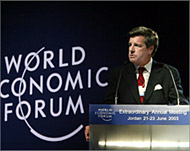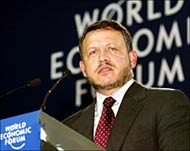WEF concludes with peace hopes
The World Economic Forum ended on Monday after three days of debates and discussions about the Israeli problem, on how to empower the Iraqi people and how to develop free trade in the Middle East.

Hundreds of political and business leaders from around the world gathered at the shores of Jordan’s Dead Sea to exchange opinions on their “visions for a shared future.”
Where they all agreed however, was that “global reconciliation” must overcome all else.
Although several political and economic initiatives to help develop the Middle East and bolster peace efforts were adopted, it was clear that Iraq was going to be the main topic.
It was at the centre of numerous bilateral meetings involving chief US civil administrator Paul Bremer. It was also Bremer’s first contact with the international community.
US Secretary of State Colin Powell announced that Bremer had plans to set up a political committee in post-war Iraq in July.
 |
| It was US civil administrator Paul Bremer’s first meeting with the international community |
Iraqi statesman Adnan Pachachi was also on board and urged the United Nations to play a “pivotal” role in Iraq to help in post-war political reconstruction.
On Sunday, after meeting Bremer, UN Secretary-General Kofi Annan said the UN will host a preparatory conference on Iraqi reconstruction that will bring together Iraqi nationals and representatives of donor nations. The meeting is to be held in New York next week.
Also on Sunday, Jordan’s Queen Rania Abdullah launched an international fund for cancer-stricken Iraqi children with the help of former US President Bill Clinton.
Iraqi leukemia victims will be treated in Jordan and other neighbouring countries, as part of the programme which will also strive to rehabilitate the Iraqi health sector.
Priority is peace
The key message of the conference was that peace must be achieved if the troubled region is to prosper.
Co-hosts of the forum Jordanian King Abdullah II and Kofi Annan, and stressed the importance of peace in the region.
“In politics, as in economics and culture, our world is being torn between the winds of globalisation and the forces of isolation. To make our way forward requires a steady purpose … (and) we must work together to keep the path,” the king said.
 |
| Jordanian King Abdullah II, along with Kofi Annan, hosted the WEF |
“The end is a beginning. Together we have worked on some of the world’s most difficult challenges … A new beginning for the Palestinian people. A new life in peace for Israelis. A new future for Iraqi children.”
Annan warned the conference that the world was at a “crossroads” and called for Iraqis to be put in control of their own future, and Israel and Palestinians to stay the course of peace with the “road map” despite escalating clashes.
Noting the sad irony of the situation, Annan expressed disappointment that the Middle East – “the cradle of civilisation”- had become “a crucible of bitter conflict.” He urged participants to seize “a real opportunity to put their painful past behind them.”
In addition, he called on the Palestinian and Israeli leadership not to be “deflected by acts of violence,” – in reference to the daily situation for Palestinians and Israelis.
Speaking on Jordanian state television before leaving the region on Monday, US Secretary of State Colin Powell renewed his country’s commitment to help both sides move forward “to achieve the vision that everybody in this region have of two states living side by side in peace”.
 |
| UN Secretary-General Kofi Annan lamented about the “crucible of bitter conflict” |
But Palestinian foreign minister Nabil Shaath said the UN, Europe and Russia must have a role in a US committee to monitor the implementation of the “road map” to peace, which envisions the creation of a Palestinian state coexisting with Israel, in two years time.
Such a move, he said, would “encourage” the Palestinians.
In other developments:
Israelis, Palestinians and Jordanians reached an “agreement in principle” to build a canal from the Red Sea to the Dead Sea. Experts say the Dead Sea could disappear in 50 years unless swift steps are taken to save it.
The wife of the emir of Qatar, Sheikha Mozah Bint Nasser al- Misnad, launched an international fund to promote higher education in Iraq.
The fund is to be administered by UNESCO and Sheikha Mozah’s Qatar Foundation for Education, Science and Community Development.
Qatar has made an initial grant of $15 million dollars.
“It is the duty of the international community to stand by Iraq in this troubled time and assist the country through this difficult transition, until it can once again stand as a world leader in education, research and culture,” she said.